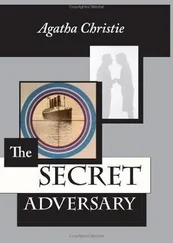He dived into a chemist’s and reappeared holding a white wrapped bottle.
vii
He unwrapped it when we got home. It was a bottle of Dr Carlton’s After Dinner Tablets.
‘You see, Hastings. There are at least fifty tablets in that bottle—perhaps more.’
He went to the bookshelf and pulled out a very large volume. For ten minutes he did not speak, then he looked up and shut the book with a bang.
‘But yes, my friend, now you may question. Now I know—everything.’
‘She was poisoned?’
‘Yes, my friend. Phosphorus poisoning.’
‘Phosphorus?’
‘Ah! mais oui —that is where the diabolical cleverness came in! Miss Wheeler had already suffered from jaundice. The symptoms of phosphorus poisoning would only look like another attack of the same complaint. Now listen, very often the symptoms of phosphorus poisoning are delayed from one to six hours. It says here’ (he opened the book again) ‘“ The person’s breath may be phosphorescent before he feels in any way affected.” That is what Miss Lawson saw in the dark—Miss Wheeler’s phosphorescent breath—“a luminous haze”. And here I will read you again. “ The jaundice having thoroughly pronounced itself the system may be considered as not only under the influence of the toxic action of phosphorus, but as suffering in addition from all the accidents incidental to the retention of the biliary secretion in the blood, nor is there from this point any special difference between phosphorus poisoning and certain affections of the liver—such, for example as yellow atrophy.” [19] This scientific explanation appears verbatim in Chapter 23 of Dumb Witness.
‘Oh! it was well planned, Hastings! Foreign matches—vermin paste. It is not difficult to get hold of phosphorus, and a very small dose will kill. The medicinal dose is from 1/100 to 1/30 grain. Even .116 of a grain has been known to kill. To make a tablet resembling one of these in the bottle—that too would not be too difficult. One can buy a tabletmaking machine, and Miss Wheeler she would not observe closely. A tablet placed at the bottom of this bottle—one day, sooner or later, Miss Wheeler will take it, and the person who put it there will have a perfect alibi, for she will not have been near the house for ten days.’
‘She?’
‘Mollie Davidson. Ah! mon ami, you did not see her eyes when that ball bounced from my pocket. The irate M. Graham, it meant nothing to him—but to her. “I did not know you kept a dog, M. Poirot.” Why a dog? Why not a child? A child, too, plays with balls. But that—it is not evidence, you say. It is only the impression of Hercule Poirot. Yes, but everything fits in. M. Graham is furious at the idea of an exhumation—he shows it. But she is more careful. She is afraid to seem unwilling. And the surprise and indignation she cannot conceal when she learns that her cousin has known of the will all along! He knew—and he did not tell her. Her crime had been in vain. Do you remember my saying it was unfortunate he didn’t tell her? Unfortunate for the poor Miss Wheeler. It meant her death sentence and all the good precautions she had taken, such as the will, were in vain.’
‘You mean the will—no, I don’t see.’
‘Why did she make that will? The incident of the dog’s ball, mon ami.
‘Imagine, Hastings, that you wish to cause the death of an old lady. You devise a simple accident. The old lady, before now, has slipped over the dog’s ball. She moves about the house in the night. Bien, you place the dog’s ball on the top of the stairs and perhaps also you place a strong thread or fine string. The old lady trips and goes headlong with a scream. Everyone rushes out. You detach your broken string while everyone else is crowding round the old lady. When they come to look for the cause of the fall, they find—the dog’s ball where he so often left it.
‘But, Hastings, now we come to something else. Suppose the old lady earlier in the evening after playing with the dog, puts the ball away in its usual place, and the dog goes out— and stays out. That is what she learns from Miss Lawson on the following day. She realises that it cannot be the dog who left the ball at the top of the stairs. She suspects the truth—but she suspects the wrong person. She suspects her nephew, James Graham, whose personality is not of the most charming. What does she do? First she writes to me—to investigate the matter. Then she changes her will and tells James Graham that she has done so. She counts on his telling Mollie though it is James she suspects. They will know that her death will bring them nothing! C’est bien imaginé for an old lady.
‘And that, mon ami, was the meaning of her dying words. I comprehend well enough the English to know that it is a door that is ajar, not a picture. The old lady is trying to tell Ellen of her suspicions. The dog—the picture above the jar on the mantelpiece with its subject—‘Out all night’ and the ball put away in the jar. That is the only ground for suspicion she has. She probably thinks her illness is natural—but at the last minute has an intuition that it is not.’
He was silent for a moment or two.
‘Ah! if only she had posted that letter. I could have saved her. Now—’
He took up a pen and drew some notepaper towards him.
‘What are you going to do?’
‘I am going to write a full and explicit account of what happened and post it to Miss Mollie Davidson with a hint that an exhumation will be applied for.’
‘And then?’
‘If she is innocent—nothing—’ said Poirot gravely. ‘If she is not innocent—we shall see.’
viii
Two days later there was a notice in the paper stating that a Miss Mollie Davidson had died of an overdose of sleeping draught. I was rather horrified. [20] This somewhat questionable procedure, with Poirot taking the law into his own hands, is also adopted in the novel.
Poirot was quite composed.
‘But no, it has all arranged itself very happily. No ugly scandal and trial for murder—Miss Wheeler she would not want that. She would have desired the privacy. On the other hand one must not leave a murderess—what do you say?—at loose. Or sooner or later, there will be another murder. Always a murderer repeats his crime. No,’ he went on dreamily ‘it has all arranged itself very well. It only remains to work upon the feelings of Miss Lawson—a task which Miss Davidson was attempting very successfully—until she reaches the pitch of handing over half her fortune to Mr James Graham who is, after all, entitled to the money. Since he was deprived of it under a misapprehension.’
He drew from his pocket the brightly coloured rubber ball.
‘Shall we send this to our friend Bob? Or shall we keep it on the mantelpiece? It is a reminder, n’est ce pas, mon ami, that nothing is too trivial to be neglected? At one end, Murder, at the other only—the incident of the dog’s ball…’
Of the many books written about Agatha Christie, the following have been most helpful:
Barnard, Robert, A Talent to Deceive (1980)
Campbell, Mark, The Pocket Essentials Guide to Agatha Christie (2006)
Morgan, Janet, Agatha Christie (1984)
Osborne, Charles, The Life and Crimes of Agatha Christie (1982)
Sanders, Dennis and Lovallo, Len, The Agatha Christie Companion (1984)
Sova, Dawn B., Agatha Christie A to Z (1996)
Thompson, Laura, Agatha Christie, An English Mystery (2007)
Читать дальше
Конец ознакомительного отрывка
Купить книгу












